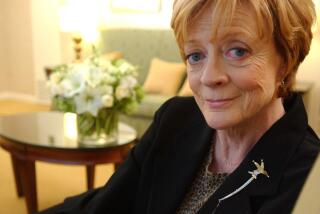Review: ‘Doctor Who’s’ Matt Smith exits with comic energy, grace
- Share via
Matt Smith — once and forever the 11th Doctor of “Doctor Who,” the British sci-fi series about a traveler in space and time — bid goodbye to the captaincy of his regenerating character Wednesday night.
It was the third regeneration in the 21st-century rebooted series, or fifth, if you count the two that current head writer Steven Moffat added by shoehorning John Hurt’s unnumbered “War Doctor” between Eight and Nine. Given that Smith spent last month’s 50th-anniversary special, “The Day of the Doctor,” gallivanting around space and time with Hurt and predecessor David Tennant, we must consider this to be likely more of an au revoir than an adieu.
If you were confused by the matter of the previous paragraph, you will only become more so as we continue. To those who are not, I must add: “Spoilers.”
There are two ways to watch the series. The first requires a deep knowledge of its complicated 50-year-history — a 34-history, if you account for the time off TV, but still, a considerable while — and an ability to keep complicated strands of time-twisting action straight in one’s head. In a sense, it almost requires you to be Steven Moffat.
The other way is to watch it for the poetry, the resonances and the connections and a sense of wonder about life (extra-terrestrially dressed at times, but our life underneath).
The seasonality of “The Time of the Doctor” was underscored by some fairy-tale narration, a lot of snow (you’ve got to have snow in a “Doctor Who” Christmas, even when it only looks like snow), and a town called Christmas, just because. (“How can a town be called Christmas?” Clara asks. “I don’t know,” the Doctor replies. “How can an Island be called Easter?”)
ESSAY: A love letter to ‘Doctor Who’
In a reversal of his usual inability to sit still, the Doctor stays put, for 300 years, as the protector of the town — a Christmas shepherd, as it were. Indeed, he grows old there, maintaining a standoff between all the villains of the universe and a local “split in the skin of reality” through which the Doctor’s own people, the Time Lords of Gallifrey, are poised to return from a pocket universe into which the Doctor, in all his incarnations, sent them in order to save them at the end of “The Day of the Doctor.” They are only waiting for him to speak his true name to know that they are in the right place, and it’s safe to come back; but he is keeping mum because their return would mean total war. (Again.)
The episode began with Christmas-comic energy — a be-my-fake-boyfriend-for-my-parents request from companion Clara Oswald (Jenna Coleman), nakedness —- and then got down to the more serious stuff without jettisoning the comedy. Some things in it didn’t quite work for me: the mechanics of the main standoff felt labored and Moffat’s continuing insistence on the importance of the Doctor’s “real name” has always felt a tad messianic, though he found a sweet way to answer, or table, the question here. (He also took care of the 13-lives-only question for the next two or three dozen years.) But it handled the changeover very well, if my own tears are anything to go by.
Even though the date of Smith’s leaving and the identity of his successor, Peter Capaldi, had been known for some time, watching the episode knowing it was Smith’s last kept at least one American viewer anxious and sad, with a finger on the pause button for when things got too heavy. Possibly there are still viewers, avid viewers even, who have never quite cottoned to him — Tennant continues to cast a long shadow — but I have loved his work. Elegant and heartfelt, authoritative and playful, swashbuckling and intimate, alien and familiar, Smith’s acting has accommodated and, as it were, humanized every oddball, paradoxical, high-concept, low-humor passage Moffat has thrown at him.
QUIZ: Test your smarts as the Doctor turns 50
Fate drives “Doctor Who” — it’s not just the past that creates the present, the future does as well. And so we got flashbacks and cameos and fish fingers and custard. There were Daleks, Weeping Angels, Sontarans and Cybermen — the disembodied head of which the Doctor had adopted as a kind of companion, whom he called “Handles.” (It’s odd how deeply one can be made to feel for a metal head in so short a time.) And crucially, there was Amy Pond — a vision, perhaps, but Karen Gillan, real enough — “the first face this face saw.”
And then it was time to go, and to go philosophically: “We’re all different people all through our lives,” said Doctor Eleven. “And that’s OK, that’s good, you got to keep moving; so long as you remember all the people that you used to be.... I will always remember when the Doctor was me.”
Then his signature bow tie fell to the floor, and in a flash Eleven became Twelve — who doesn’t like the color of his new kidneys and has one question for Clara: “Do you happen to know how to fly this thing?”
More to Read
The complete guide to home viewing
Get Screen Gab for everything about the TV shows and streaming movies everyone’s talking about.
You may occasionally receive promotional content from the Los Angeles Times.







